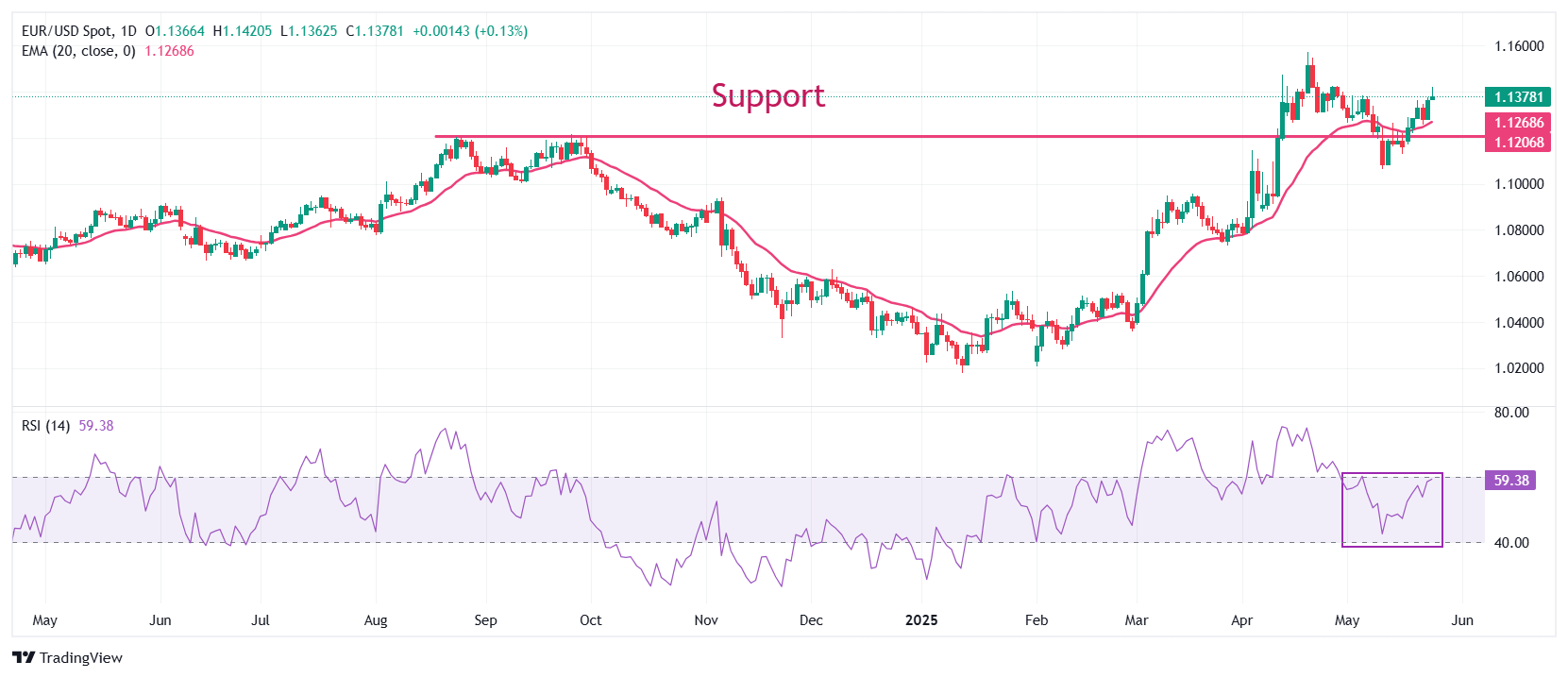Created
: 2025.05.26













![]() 2025.05.26 19:47
2025.05.26 19:47
EUR/USD jumps above 1.1400 during European trading hours on Monday, the highest level seen this month. The major currency pair gains as the US Dollar (USD) falters on erratic statements coming from Washington regarding tariff policies. The US Dollar Index (DXY), which tracks the Greenback's value against six major currencies, slides below 99.00.
Over the weekend, Trump suspended his decision to impose flat 50% tariffs on the European Union (EU) until July 9, after the old continent agreed to advance trade negotiations quickly and urged for some time to reach a good deal.
European Commission President Ursula von der Leyen said in a post on X on Sunday that she had a "good" phone call with Trump and that the EU was ready to "advance talks swiftly and decisively." "To reach a good deal, we would need the time until July 9," she added.
On Friday, US President Trump threatened to impose 50% tariffs on imports from the EU in a post on Truth.Social, which were expected to come into effect on June 1. "Our discussions with them are going nowhere! Therefore, I am recommending a straight 50% tariff on the European Union, starting on June 1, 2025," Trump wrote.
A quick de-escalation in trade tensions between economies situated on both sides of the Atlantic has provided relief to their equity markets and the Euro (EU), but has put the credibility of the US Dollar under suspicion again.
The Greenback has substantially suffered in past few months as events such as ever-changing Trump's tariff policies, threats to remove Federal Reserve's (Fed) Chair Jerome Powell and a new tax cut and spending bill that is expected to increase already ballooning nation's debt by $3.8 trillion have dampened USD's safe-haven appeal. Increasing doubts over the Greenback's credibility have also increased the Euro's appeal. "We think the euro is continuing to benefit from being the most liquid alternative to the dollar," ING said.

EUR/USD posts a fresh almost a month high near 1.1420 at the start of the week. The near-term outlook of the pair is bullish as it holds the 20-day Exponential Moving Average (EMA), which is around 1.1270.
The 14-period Relative Strength Index (RSI) rises to near 60.00. Bulls would come into action if the RSI breaks above the 60.00 level.
Looking up, the April 21 high of 1.1475 will be the major resistance for the pair. Conversely, the September 25 high of 1.1215 will be a key support for the Euro bulls.
The Euro is the currency for the 19 European Union countries that belong to the Eurozone. It is the second most heavily traded currency in the world behind the US Dollar. In 2022, it accounted for 31% of all foreign exchange transactions, with an average daily turnover of over $2.2 trillion a day. EUR/USD is the most heavily traded currency pair in the world, accounting for an estimated 30% off all transactions, followed by EUR/JPY (4%), EUR/GBP (3%) and EUR/AUD (2%).
The European Central Bank (ECB) in Frankfurt, Germany, is the reserve bank for the Eurozone. The ECB sets interest rates and manages monetary policy. The ECB's primary mandate is to maintain price stability, which means either controlling inflation or stimulating growth. Its primary tool is the raising or lowering of interest rates. Relatively high interest rates - or the expectation of higher rates - will usually benefit the Euro and vice versa. The ECB Governing Council makes monetary policy decisions at meetings held eight times a year. Decisions are made by heads of the Eurozone national banks and six permanent members, including the President of the ECB, Christine Lagarde.
Eurozone inflation data, measured by the Harmonized Index of Consumer Prices (HICP), is an important econometric for the Euro. If inflation rises more than expected, especially if above the ECB's 2% target, it obliges the ECB to raise interest rates to bring it back under control. Relatively high interest rates compared to its counterparts will usually benefit the Euro, as it makes the region more attractive as a place for global investors to park their money.
Data releases gauge the health of the economy and can impact on the Euro. Indicators such as GDP, Manufacturing and Services PMIs, employment, and consumer sentiment surveys can all influence the direction of the single currency. A strong economy is good for the Euro. Not only does it attract more foreign investment but it may encourage the ECB to put up interest rates, which will directly strengthen the Euro. Otherwise, if economic data is weak, the Euro is likely to fall. Economic data for the four largest economies in the euro area (Germany, France, Italy and Spain) are especially significant, as they account for 75% of the Eurozone's economy.
Another significant data release for the Euro is the Trade Balance. This indicator measures the difference between what a country earns from its exports and what it spends on imports over a given period. If a country produces highly sought after exports then its currency will gain in value purely from the extra demand created from foreign buyers seeking to purchase these goods. Therefore, a positive net Trade Balance strengthens a currency and vice versa for a negative balance.
![]()
Created
: 2025.05.26
![]()
Last updated
: 2025.05.26

FXStreet is a forex information website, delivering market analysis and news articles 24/7.
It features a number of articles contributed by well-known analysts, in addition to the ones by its editorial team.
Founded in 2000 by Francesc Riverola, a Spanish economist, it has grown to become a world-renowned information website.
We hope you find this article useful. Any comments or suggestions will be greatly appreciated.
We are also looking for writers with extensive experience in forex and crypto to join us.
please contact us at [email protected].
Disclaimer:
All information and content provided on this website is provided for informational purposes only and is not intended to solicit any investment. Although all efforts are made in order to ensure that the information is correct, no guarantee is provided for the accuracy of any content on this website. Any decision made shall be the responsibility of the investor and Myforex does not take any responsibility whatsoever regarding the use of any information provided herein.
The content provided on this website belongs to Myforex and, where stated, the relevant licensors. All rights are reserved by Myforex and the relevant licensors, and no content of this website, whether in full or in part, shall be copied or displayed elsewhere without the explicit written permission of the relevant copyright holder. If you wish to use any part of the content provided on this website, please ensure that you contact Myforex.
Myforex uses cookies to improve the convenience and functionality of this website. This website may include cookies not only by us but also by third parties (advertisers, log analysts, etc.) for the purpose of tracking the activities of users. Cookie policy